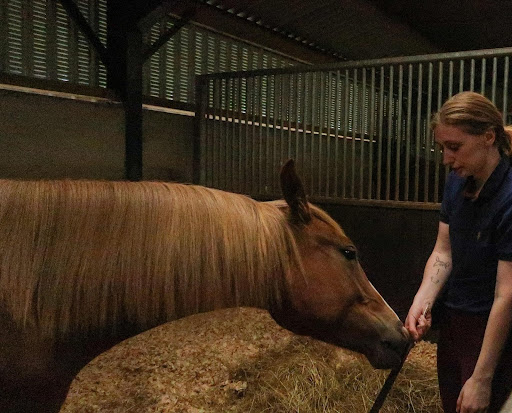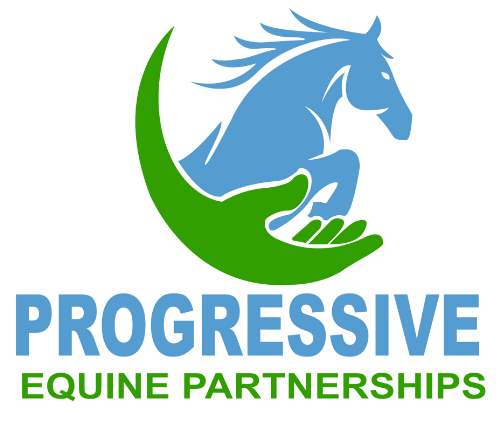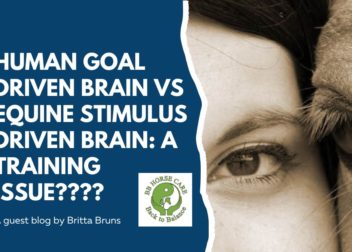Cooperative Care: A kinder Approach in the Traditional World
Cooperative Care: A kinder Approach in the Traditional World by Hayley Cole (BL Horsemanship)
Introduction
In the horse world, the traditional methods often involve pressure, coercion and force. When
a horse is already in a vulnerable position the additional pressure can create lasting negative
associations, which makes future procedures difficult and distressing for the horse. However,
there is a gentle alternative in which horses can be prepared for husbandry procedures
using positive reinforcement. Horses can actively participate in essential procedures such as
vet visits, farrier visits and even for medication administration such as syringing or using an
inhaler. In this blog, we will explore the concept of cooperative care and how it can change
the way we interact with horses.
Understanding the Pressure and Force Traditional Care Imposes
The traditional approach to care has relied on force to achieve compliance from horses.
However these practices often leave horses feeling anxious and overwhelmed. The impact
this has on a horse’s emotional state is significant and creates aversions to future
procedures. The more negative experiences and associations a horse has with these
procedures the more reactive they can become; which is not only stressful for the horse but
dangerous for the humans involved as well. In an emergency situation physical restraint and
force may be required for a successful outcome/ recovery however for regular appointments
the horse can be prepared ethically to participate, and force should not be relied on. It’s time
to recognise that compliance is not willing participation and explore a kinder approach for our
horses.
The Benefits of Cooperative Care
Cooperative care is about empowering horses to actively participate in their own healthcare
which gives them autonomy over their body, leading to numerous benefits for both the horse
and the human. By using positive reinforcement we can take a potential aversive stimuli and
counter condition it to then be an appetitive stimuli. This means we can transform a
potentially stressful experience into a cooperative interaction that is positive, meaning the
horse is more likely to display the desired behaviour. This reduces stress during veterinary
procedures and farrier visits and increases trust, which will make future appointments more
pleasant and positive for the horse. The willingness to participate in the procedure also
increases safety for the human involved which makes it a more positive experience for all
involved.
Cooperative Care at BL Horsemanship
BL Horsemanship uses Cooperative care to prepare horses for the traditional world ethically.
I am currently working with my yearling who was unhandled for the first 12 months of his life
using positive reinforcement; cooperative care has been used to introduce him to farrier
visits, having cream applied to his body and even to administer antibiotics with a syringe. I
have fostered this approach to ensure that he feels comfortable during visits which will make
the experience a lot more enjoyable for him. After complications with castration and then
contracting an infection he had a lot of negative associations with vets; I have been using
positive reinforcement to rebuild his trust and create new, nice experiences to make future
appointments easier and force free for him.


How is Cooperative Care achieved?
First of all, it is imperative to establish a strong foundation of trust with the horse before getting started with cooperative training. Cooperative care is all about building a trusting and positive relationship with your horse so husbandry experiences are calm and give them a choice. Your horse should have a good understanding of positive reinforcement and have the correct association of the reward before implementing cooperative training into your routine. It is important to break steps down into small approximations that are manageable for the horse; this will increase the chances of a successful training session. A simple task that the horse can already perform such as lifting their leg is what should be used as a starting point. Gradually the more complex tasks can be asked of the horse when it is ready. It is vital to use clear and consistent cues so the horse can understand what is expected of them. Each horse will progress at their own pace; plenty of time should be allocated to prepare a horse for a visit so the experience is not daunting and they can remain within their threshold.
Conclusion
As more information becomes available and the horse world evolves, it is important to embrace more compassionate practices. Cooperative care offers a kinder alternative to coercion and force and empowers the horse to participate and be rewarded for doing so. This practice has been shown to enhance their well being and improve their trust in veterinary professionals and farriers. BL Horsemanship hopes to revolutionise horsemanship with these methods, by putting the horse’s needs and welfare at the forefront. Let’s embrace this transformation and create a kinder, harmonious world for our horses.
BL Horsemanship is an educational platform offering insights on equine behaviour, poor performance/pain, and ethical training practices. Led by a passionate behaviour enthusiast Hayley, the content aims to educate horse owners and enthusiasts about the intricacies of interacting with their horses ethically and humanely. The content posted on social media offers easy-to-understand explanations of horse body language and how it can be used to gain a better understanding of the horse to create a stronger partnership. BL Horsemanship addresses the issues and misconceptions of pain and how it can impact performance and behaviour that is often missed or normalised in traditional practices. By sharing knowledge and experience, BL Horsemanship fosters an enriching and supportive environment for others wanting to gain a better understanding of their horse whilst using reward based training.
To contact BL Horsemanship or leave a review of their services visit our directory – https://progressiveequinepartnerships.com/member/bl-horsemanship/






